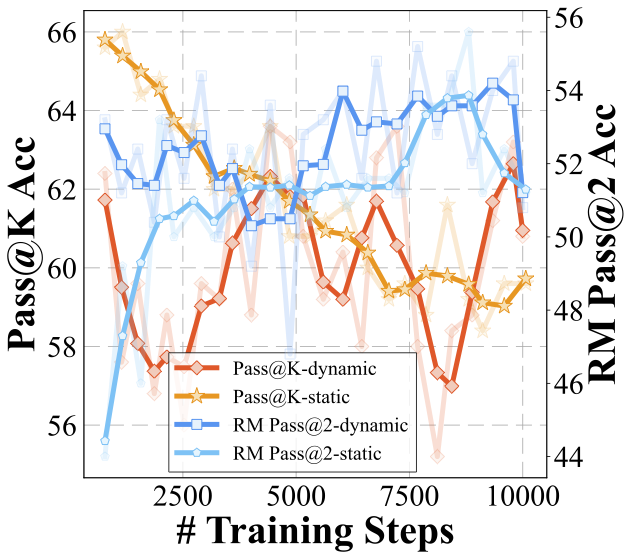M-STAR

M-STAR is a framework to improve the Multimodal Reasoning ability of Large Multimodal Models (LMMs) via Self-Evolving Training.
Unlike traditional Self-Evolving Training, M-STAR supports Large Multimodal Models, Training with Multimodal Process Reward Models (MPRM), and Adaptive Explorations during Training.
This is M-STAR-MiniCPM-V-2.5 model based on MiniCPM-Llama3-V-2_5, which has been trained using M-STAR, our self-evolving training framework for multimodal reasoning.
M-STAR Resources:
Component Description M-STAR Model A strong LMM for multimodal reasoning, scoring 59.5 on MathVista, based on MiniCPM-V-2.5 with 8B parameters. M-STAR PRM A Multimodal Process Reward Model (MPRM) that evaluates the quality of multimodal reasoning data at the step level. M-STAR CoT Dataset A collection of 100K generated multimodal reasoning data with CoT, where the queries are sourced from MathV360K. M-STAR MPRM Training Dataset A set of 50K multimodal reasoning data designed for training MPRM.
Performance
Main Results
| MathVista | FQA | GPS | MWP | TQA | VQA | |
|---|---|---|---|---|---|---|
| Baselines | ||||||
| MiniCPM-V-2.5 | 52.4 | 59.2 | 44.7 | 50.5 | 53.8 | 48.0 |
| + warmup | 52.6 | 58.4 | 47.1 | 57.0 | 53.8 | 45.8 |
| SFT | 54.8 | 58.7 | 50.5 | 56.5 | 55.7 | 50.8 |
| ReSTEM | 55.1 | 59.1 | 49.5 | 65.6 | 55.1 | 48.0 |
| Iterative RFT | 55.7 | 59.1 | 49.5 | 64.5 | 55.1 | 47.5 |
| Static components only | ||||||
| Cont. Self-Evolving | 57.2 | 57.6 | 56.3 | 65.1 | 57.0 | 49.7 |
| + PRM Re-Rank | 59.2 | 59.1↑0.7 | 61.1↑14 | 68.3↑11.3 | 55.1↑1.3 | 51.4↑5.6 |
| Automatically tuning the temperature T | ||||||
| M-STAR (Reward-Pass@2) | 59.5 (+6.9) | 59.5↑1.1 | 59.1↑12 | 65.6↑8.6 | 58.9↑5.1 | 54.2↑8.4 |
| Reference | ||||||
| GPT-4o | 63.8 | - | - | - | - | - |
| Gemini 1.5 Flash | 58.4 | - | - | - | - | - |
| GPT-4T 2024-04-09 | 58.1 | - | - | - | - | - |
| Pixtral 12B | 58.0 | - | - | - | - | - |
| InternLM-XComposer2-VL-7B | 57.6 | 55.0 | 63.0 | 73.7 | 56.3 | 39.7 |
| Math-LLaVA-13B | 46.6 | 37.2 | 57.7 | 56.5 | 51.3 | 33.5 |
| LLaVA-NeXT-34B | 46.5 | - | - | - | - | - |
| Model | MathVista | M3CoT | MMStar-R | MMBench-R | AI2D | Average |
|---|---|---|---|---|---|---|
| MiniCPM-V-2.5 | 52.4 | 41.2 | 44.6 | 72.6 | 64.4 | 55.0 |
| + warmup | 52.6 | 47.8 | 45.1 | 76.9 | 65.9 | 57.7 |
| M-STAR | 59.5↑6.9 | 48.7↑0.9 | 50.7↑5.6 | 79.9↑3 | 69.1↑3.2 | 61.6↑3.9 |
| Phi-3.5-vision | 46.5 | 39.4 | 42.5 | 56.8 | 47.5 | 46.5 |
| + warmup | 49.3 | 46.5 | 44.2 | 70.9 | 65.5 | 55.3 |
| M-STAR | 54.5↑5.2 | 51.3↑4.8 | 48.8↑4.6 | 73.6↑2.7 | 67.9↑2.4 | 59.2↑3.9 |
| InternVL2-2B | 46.4 | 16.7 | 20.0 | 14.2 | 33.5 | 26.2 |
| + warmup | 47.6 | 45.6 | 41.8 | 68.8 | 60.0 | 52.8 |
| M-STAR | 50.3↑2.7 | 47.1↑1.5 | 42.0↑0.2 | 67.3↓1.5 | 59.7↓0.3 | 53.3↑0.5 |
Effectiveness of Adaptively Adjusting Exploration

Evaluating the effectiveness of adaptively adjusting exploration:
- Reward-Pass@2: The percentage of samples for which there exist correct responses among the top 2 responses ranked by the reward model. This metric directly reflects the exploitation efficacy of the reward model for the current policy. We choose Pass@2 since our training strategy involves selecting the top 2 responses using the reward model.
"Static" refers to models trained without adaptive exploration, while "Dynamic" indicates those trained with this mechanism. All models shown were trained using the M-STAR framework with optimized components as explored in our paper.
M-STAR Resources
| Resource | Link | License |
|---|---|---|
| M-STAR Datasets | ||
| M-STAR CoT Dataset | ... | MIT License |
| M-STAR MPRM Training Dataset | ... | MIT License |
| M-STAR Models | ||
| M-STAR-8B-v1.0 | ... | MiniCPM Model License |
| M-STAR-PRM-8B-v1.0 | ... | MiniCPM Model License |
- Downloads last month
- 0
Model tree for hkust-nlp/mstar-8b-v1.0
Base model
openbmb/MiniCPM-Llama3-V-2_5